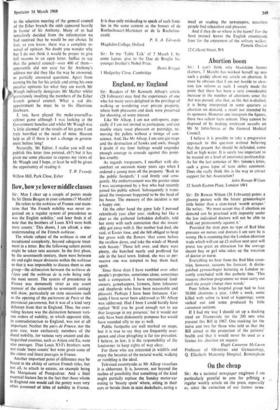Bow, bow ye lower middle classes
Sir: May I clear up a couple of points made by Sir Denis Brogan in your columns (7 March)? He refers to the noblesse of France and main- tains that `the French nobility was never or- ganised on a regular system of precedence as was the English nobility,' and later finds it of note that the brothers of Louis XVI were both mere counts.' This shows, I am afraid, a mis- understanding of the French noblesse.
The whole subject of the noblesse is one of exceptional complexity, beyond adequate treat- ment in a letter. But the following salient points might be taken into account. In the first place, by the seventeenth century, there were between six and eight major divisions within the noblesse so that it was impossible to discuss them as one group—the delineation between the noblesse de tepee and the noblesse de la robe being only the most recent. The system of precedence in France was immensely strict as any court memoir of the sixteenth to seventeeth century will show, particularly on state occasions such as the opening of the parlement de Paris or the provincial partements, but it was of a kind very different from that in England. Thus, the over- riding feature was the distinction between vari- ous orders of nobility, in which apparent title, in contradistinction to England, was not at all important. Neither the pairs de France, nor the gens titre, were exclusively members of the ducal nobility, for various very ancient and dis- tinguished counties, such as Anjou and Eu, were also peerages. Thus Louis XVI's brothers were not made 'mere counts' but were given some of the oldest and finest peerages in France.
Another important point of difference may be found in the ability of certain French tides, but not all, to attach to estates, an example being the Marquisate of Pompadour. And a flirt essential feature lies in the fact that those whom in England one would call the gentry were very Often possessed of titles of nobility in France.
It is thus only misleading to speak of such fami- lies in the same context as the houses of de Rochechouart-Martenart or de la Rochefou- cauld.
P. S. A. Edwards
Magdalen College, Oxford


































 Previous page
Previous page